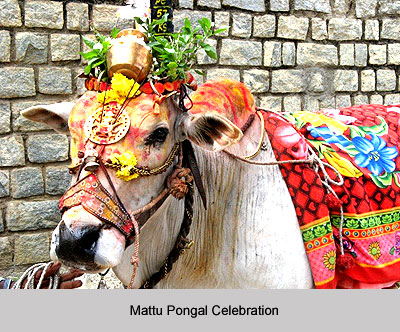 Mattu Pongal is for celebration of the cattle, especially cows and bulls that play a major role by working hard to help the farmers to raise crops on their fields, falls on the following day, the 15th of January.
Mattu Pongal is for celebration of the cattle, especially cows and bulls that play a major role by working hard to help the farmers to raise crops on their fields, falls on the following day, the 15th of January.
It is a special occasion when the landlord and the peasant, rich and poor, old and young dine together in a spirit of bonhomie without any restraint of caste and creed. The festival is an occasion when the fresh harvests from the fields are shared in the form of food and sweets with the community as well as with animals and birds. It represents the change of season.
Jallikattu
An important village sport, called the Jallikattu or `Manji Virattu`` is an integral part of the Mattu Pongal festival. It is observed with great enthusiasm in the villages of Tamil Nadu. It is held in the evening of the Mattu Pongal day. Earlier it was the day when fierce bulls were chased by young youths of the village in order to retrieve the money that was tied to the horns of the bulls. Now it is held as a regular bull fight sports in demarcated rings in villages where the bull owners and the young men fighting the bulls vie for the prizes.
Legend of Mattu Pongal
Mattu Pongal is made up of two words; `Mattu` in Tamil means "cow". Pongal means "boiled rice" but metaphorically means prosperity. The Pongal festival represents celebration of "fertility and renewal" and is observed either for three days or four-days, after the end of the monsoon season and rice crop is harvested.
According to a legend Lord Shiva sent his bull Nandi from heaven to the earth to give his message to people that they should have an oil bath every day and eat once a month. Nandi wrongly advised people to take an oil bath once a month and eat every day. Shiva was annoyed and in anger, banished Nandi to permanently live on earth and help the farmers to produce the extra food crops needed for people to eat every day.
On Mattu Pongal Kolam or threshold drawings are drawn with coloured rice powder or chalk powder, in the front yard of the houses, after due washing of the yard. On the the Mattu Pongal day Kolam depicts cows also.
On the Mattu Pongal day, cattle are washed, their horns painted and decorated with shining metal caps. Multi-coloured beads, tinkling bells, sheaves of corn and flower garlands are tied around their necks. Turmeric and kumkum are put on the foreheads of the cattle. The cow-keepers dressed sprinkle the cattle with saffron water with mango leaves with prayers to protect them from evil and shout "Pongal! Pongal!" Devotees pay their respect to cows by bending down and touching their feet and foreheads, followed by an aarti and offering the cattle Prasad. The cattle are taken in a procession, attended by bands of music, through the village streets.



















